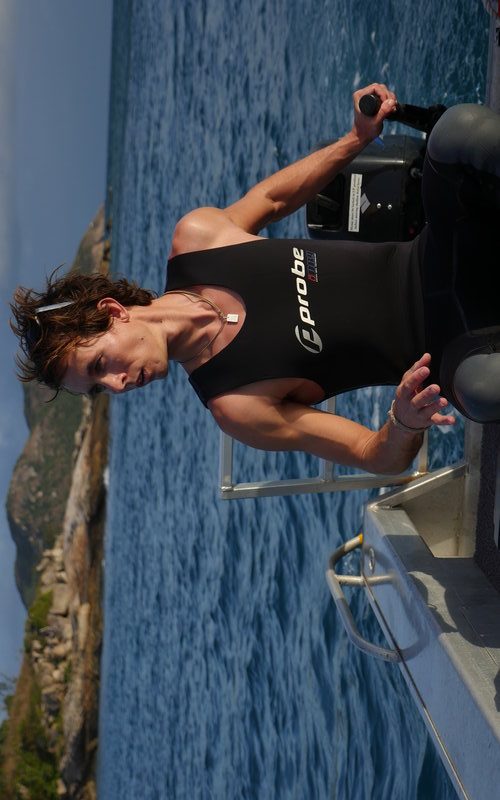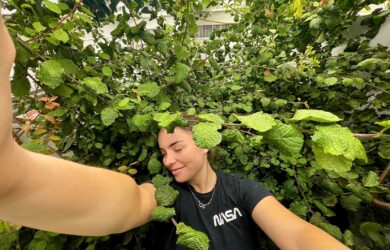
Alex Vail on how he is using his PhD in his work as a cameraman on nature documentaries.
I spend a lot of time trying to understand what animals are doing, just as I did as a researcher, but instead of writing in scientific publications I am part of a team making documentaries that bring this understanding directly to the public.
Alex Vail
Alex Vail’s PhD was fuelled by a long-term passion for studying fish behaviour. Having grown up on the remote Lizard Island Research Station in Northern Australia, he spent his childhood surrounded by visiting marine biologists. Now a few years after finishing his PhD he continues to follow that passion, but this time through documentary-making.
Alex [2010] started his work as a cameraman at the top – doing some research and a little filming on Sir David Attenborough’s Great Barrier Reef series. Over the last two years he has filmed primarily for Blue Planet 2 which launches in the autumn.
He says it was a difficult decision to leave academia, but that his documentary work fits his interests and personality. He states: "I spend a lot of time trying to understand what animals are doing, just as I did as a researcher, but instead of writing in scientific publications I am part of a team making documentaries that bring this understanding directly to the public.”
He admits it can be a challenge to portray scientific research in a way that is accurate and can also capture the interest of the wider public. "You have to use your discretion – sometimes if something is 100% correct scientifically people will not understand it. The main thing is to give people the general idea accurately. Most of my friends who are scientists love watching nature documentaries and they understand what they are trying to do. So many of them were inspired by them as children," says Alex.
For him a childhood growing up in a remote research station run by his parents, both biologists, was inspiration in itself.
Growing up on Lizard Island
From the age of four, Alex lived on Lizard Island, a 7 km squared speck of coral-fringed granite 270 km north of the Australian city of Cairns. He was the only child living on the island at the time and was taught via Australia’s School of the Air, a pioneering programme that has educated children throughout outback Australia since the 1960s using HF radio.
“Researchers came from all over the world to do their fieldwork, working on everything from worms and corals to sharks and whales. Apart from occasional visits from my cousins, it was just me and the biologists, which was just fine with me,” he says.
At 13, wanting to mix with other teenagers, Alex moved to a boarding school in Sydney. He then moved back to Queensland and James Cook University to study Zoology and Marine Biology, the subjects that had fascinated him since childhood.
If Lizard Island instilled in Vail a desire to study the natural world, volunteering on several African wildlife research projects during his time as an undergraduate exposed him to human poverty and its impact on other species.
But it was marine life that fascinated him. In 2010, before he came to Cambridge, Vail canoed around Indonesia’s Togean Islands and won an award from Australian Geographic for his account of the trip. It highlighted for him the problem of overfishing. He had hoped to find evidence of local fishermen living sustainably in harmony with their environment, but instead he says there was a dearth of fish because they had been “hammered” by the local population.
Fish intelligence
When it came to deciding what to research for his PhD in Zoology, Alex decided to focus on investigating fish intelligence and cooperation between species over hunting for food.
He studied, for example, whether there are long-term relationships between morays and groupers – previous research had shown that grouper chase fish into coral and then waggle their heads to show the eels where the fish they like to eat are hidden. Alex also wanted to investigate whether groupers buddy-up with specific moray eels that are best at helping them hunt. To test his theory about the tight relationships between eels and groupers, he implanted eels with transmitters to allow him to track them down daily and placed small video cameras in front of them to observe their behaviour. This revealed a range of interactions with other species that have never been reported, and which shed light on the evolution of cooperative hunting.
Alex’s research at Cambridge, where he was based at St John's College, also extended to other species, including coral trout, and the results of that research were published in the journal Current Biology in 2014. A study he led was the first to show that chimpanzees are not the only non-human species that can choose the right situation and the right partner to get the best result when collaboratively working. His study cross-examined the collaborative capacities of coral trout, which uses gestures and signals to flag the location of prey to an eel, with chimpanzees using comparably similar experiments, and found that the fish perform as well – if not better – than humankind’s closest evolutionary relative when it comes to successful collaboration.
Alex says his current work as a cameraman combines his studies on fish intelligence with a long-term interest in the creative arts. In addition to filming fish behaviour for his research, he had done a lot of stills photos and videos of animals as a hobby for years and says the option of becoming a cameraman had been at the back of his head for some time. Indeed he and his two companions filmed the canoe expedition around the Togean Islands.
Part of the filming for the Great Barrier Reef documentary was done on Lizard Island and Alex helped with researching stories and setting up filming. "It was amazing spending a couple of days with Sir David Attenborough,” he says. “He was everything you would hope he would be – so switched on and genuinely interested in all the topics he was talking about. He talked to all the scientists, took in everything they said and then delivered it very eloquently to camera. It's not an easy thing to do.”
After that Alex started doing a bit of filming for Blue Planet and it snowballed from there. Initially he was working on Lizard Island, but he now works all over Australia on subjects ranging from shark behaviour to coral bleaching. He has also done a little bit of presenting on fish behaviour because of his knowledge of the subject.
Alex has also been working on his own documentary on fish intelligence for the last couple of years, but he is focusing more on getting more experience as a cameraman at the moment.
He is grateful for his time as a Gates Cambridge Scholar and says that, in addition to funding his research, it meant he was surrounded by scholars who were "united by big ideas of what they wanted to achieve from their work". It also gave him the opportunity to do more public speaking, including presenting at the Trustees symposium. "That meant I had to think how to convey complex science to people who were not necessarily scientists," he says. And he adds: "What marks Gates Cambridge people is a desire to communicate their research to the general public and make a big impact. That has shaped the direction I have gone in.”
Alexander Vail
- Alumni
- Australia
- 2010 PhD Zoology
- St John's College
This past year has certainly been a life altering and exciting one! It began by ushering in 2010 while paddling a dugout canoe in remote Sulawesi, undertaking a self-founded Australian Geographic sponsored expedition to raise awareness about living sustainably with fragile environments. After recovering from dengue fever it was off to South America to cycle through Patagonia and explore as much of the continent as possible, partially offsetting the costs by freelancing for Australian Geographic Outdoor magazine. However one of my most significant events of the year has been the generosity afforded to me by the Gates Cambridge Trust. The scholarship they have awarded me is now allowing me to do what I dreamed of: to study a PhD examining cooperative hunting and cognition at Cambridge. This is an immense privilege, and I plan to use what I learn to help positively influence public attitudes towards our world's imperiled natural environment.












